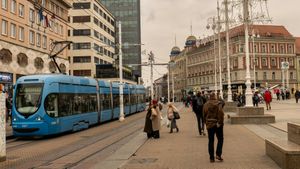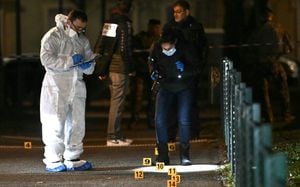Russia's willingness to play a role in reconstructing Ukraine using frozen assets appears increasingly plausible. Reports suggest Moscow may agree to use approximately $300 billion of its frozen sovereign assets held abroad as part of negotiations with the United States concerning the Ukrainian conflict. This potential compromise highlights the shifting dynamics between Russia and Western nations amid the continued hostilities.
According to Reuters, the idea of utilizing frozen assets for Ukraine's rebuilding is unprecedented. This development could represent the type of concession Russia is prepared to offer during discussions aimed at ending the conflict. A source familiar with the talks stated, "Russia might agree to transfer up to two-thirds of its frozen reserves to assist with recovery efforts for Ukraine." The remaining portion of these assets could potentially be allocated for reconstructing territories within Ukraine currently controlled by Russia.
Despite this seemingly generous offer, the same source indicated significant conditions remain. Specifically, Moscow is reportedly seeking the removal of asset freezes as part of any gradual easing of sanctions it would negotiate. This stipulation emphasizes Russia's intent to maintain leverage over the reconstruction process.
On the Ukrainian side, officials indicate they believe they have mechanisms at their disposal to compel Russia to engage meaningfully in peace talks. According to Mykhailo Podoliak, advisor to the Ukrainian President’s office, economic pressure is one of two primary tools available. He stated, “Sanctions on oil coupled with increased missile and drone attacks within Russian territory will likely encourage Russia to negotiate.”
Suggesting optimism for peace, Kyrylo Budanov, head of Ukrainian military intelligence, mentioned, “A ceasefire agreement between Russia and Ukraine could very well be feasible this year.” Diplomatic conversations between U.S. and Russian representatives over the Ukrainian situation took place recently, marking the first direct talks aimed at conflict resolution.
Previous financial sanctions established by the United States and its allies have drastically limited Russia’s access to its overseas assets, which include $300-$350 billion predominantly held as government bonds across European, American, and British markets. The confiscation of these reserves raised concerns among various European officials, particularly within Germany and the European Central Bank, about the legality and broader ramifications of such actions, warning it could diminish the euro's status as a key reserve currency.
Russian officials voiced their apprehensions about the potential confiscation of state assets, stressing it contradicts free market principles and undermines banking security and trust. To counter Western sanctions, Russia has drafted legislation aimed at seizing assets from companies and investors linked with nations deemed hostile due to imposing sanctions.
Simultaneously, Russia’s ambitions to encourage Western firms to re-enter its market depend on the lifting of sanctions, as emphasized by First Deputy Prime Minister Denis Manturov. He asserted, “Only once sanctions are lifted can we discuss the possibility of businesses returning.”
The increasing prospect of businesses reopening their operations within Russia could hint at shifting economic strategies. Despite the overarching geopolitical tensions, Manturov remains optimistic about discussions surrounding the re-engagement of Western firms, particularly if sanctions are removed. He mentioned, “No proposals have been made yet concerning their return.”
Given the challenging backdrop of the current geopolitical climate, many Western corporations may find it difficult to navigate the new reality of the Russian market following extensive damage. Reports indicate American businesses have sustained over $400 billion in losses since halting their operations. Yet, there are signs of renewed interest, as companies like Gucci have recently sought legal protection within Russia.
While some firms contemplate reentering the market as soon as Q2 of 2025, challenges remain evident. RDIF Director Kirill Dmitriev noted, “Despite some companies showing interest, reintegration will not be straightforward due to existing competition from new entrants.”
Meanwhile, Putin’s administration is also exploring collaborative opportunities with successful business figures. Recently, President Vladimir Putin suggested Gazprombank collaborate with Elon Musk on technological advancements, including homegrown battery production for aerospace applications. Putin expressed hope for partnerships, particularly as “once the U.S. government reshuffles, innovation will resurface.”
Despite no American firms confirming plans to resume business operations, prospects seem aligned with shifting perspectives and negotiations highlighting the intersection of economic realities and geopolitical maneuvers. The potential thawing of relations alongside accompanying asset transfer ideas reflects the complicated path forward for Russia and Ukraine, as well as the broader international community standing watch.
Overall, as discussions on reconstruction funding evolve, the coming months may reveal the dynamic interplay of political will, economic interests, and the urgent necessity for recovery efforts following prolonged devastation.



